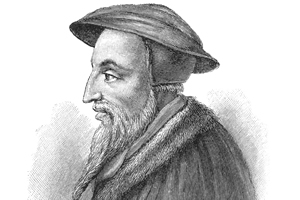Answered Prayer
John Calvin was born 10 July 1509 at Noyon in Picardy, France. His father was an attorney, who practiced both canon and civil law. In 1523, he matriculated at the University of Paris; from 1528-32, he studied at Orléans as a law student. The majority of his biographers date his sudden and unexpected conversion to Christianity in 1533. By 1536, he was ready to proclaim the need for reformation, and was determined to establish a devout, disciplined, and godly community in Geneva, Switzerland.
 Calvin was only twenty-seven when he wrote his magnum opus, Institutes of the Christian Religion, which provided one of the most systematic expositions of Protestant theology. His theology was the political and social ethic for the early American colonies. John Adams, the second president of the United States, esteemed Geneva as “the first Puritan state.” At the time of the American Revolution, Adams urged, “Let not Geneva be forgotten or despised. Religious liberty owes it much respect.”
Calvin was only twenty-seven when he wrote his magnum opus, Institutes of the Christian Religion, which provided one of the most systematic expositions of Protestant theology. His theology was the political and social ethic for the early American colonies. John Adams, the second president of the United States, esteemed Geneva as “the first Puritan state.” At the time of the American Revolution, Adams urged, “Let not Geneva be forgotten or despised. Religious liberty owes it much respect.”
Calvin’s Commentaries were also a profound influence upon the mind and life of the church. His two-volume commentary on Daniel contains much to learn regarding godliness and prayer. He was a pastor and taught Scripture regularly for his congregations in Geneva. Of course, he always ended his teachings with prayer. One example of those prayers is taken from his study of Daniel 10.
Grant, Almighty God, as thou didst formerly appear to Daniel thy holy servant, and to the other prophets, and by their doctrine didst render thy glory conspicuous to us at this day, that we may reverently approach and behold it. When we have become entirely devoted to thee, may those mysteries which it has pleased thee to offer by means of their hand and labors, receive from us their due estimation. May we be cast down in ourselves and raised by hope and faith towards heaven; when prostrate before thy face, may we so conduct ourselves in the world, as in the interval to become free from all the depraved desires and passions of our flesh, and dwell mentally in heaven. Then at length may we be withdrawn from this earthly warfare, and arrive at that celestial rest which thou hast prepared for us, through the same Jesus Christ our Lord.—Amen
[John Calvin, Commentaries on the Book of the Prophet Daniel, 2 vols. (Edinburgh: Calvin Translation Society, 1853) 2:245-46]
God is not going to appear today as He did to Daniel. Nevertheless, it is possible to know the majesty of God as Daniel did. Daniel’s response to the vision he received is a reminder of just how frail human nature is, yet proves God’s infinite power to care not only for the prophet but also for all His people.
DANIEL WAS TERRIFIED
(Dan 10:1-9) Daniel 10 prepares the reader for the final vision God revealed to the prophet, in addition to being preliminary for the prophecy of Daniel 11, which describes the end times as a period involving unprecedented conflict and trouble for God’s people. Daniel received the Lord’s message “in the third year of Cyrus” (v. 1). By this time, the first group of exiles had returned to Judah and were rebuilding the Temple in Jerusalem, although work ceased due to opposition (Ezra 1—2; 4:24).
Daniel may have “been mourning” because only a few Jews returned with Ezra from the Babylonian captivity, and/or because he knew there was opposition in rebuilding the Temple. Daniel may not have returned due to his age, and he could serve the exiles more effectively by remaining a leading government official. He did eat but not anything particularly desirable, nor did he drink any wine or “use any ointment at all” (v. 3). While the Bible does frequently mention fasting in relation to prayer and repentance, it would be wrong to understand Daniel’s practice in that manner, since his actions were more a form of self-denial. Daniel’s physical asceticism was not typical of his lifestyle. He probably wanted to prepare himself inwardly and outwardly for God’s message, so he temporarily disregarded the normal comforts of life.
Daniel had likely concluded his dietary restrictions and was engaged in official business near “the bank of the great river, that is, the Tigris” (v. 4). He looked and saw “a certain man dressed in linen, whose waist was girded with a belt of pure gold” (v. 5). The linen possibly signifies purity (cf. Exod 28:42), while the belt indicated a person of significance. Ezekiel (9:2) saw angels clothed in linen. The figure Daniel saw was certainly glorious (Dan 10:6). He “alone saw the vision” though “a great dread fell” on his companions, “and they ran away to hide themselves” (v. 7; cf. Acts 9:7). Having been “left alone,” Daniel found no strength residing in him and “fell into a deep sleep” with his “face to the ground” (vv. 8-9).
DANIEL COMFORTED
(Dan 10:10—11:1) With just a touch (apparently by an angel), Daniel was strengthened from an exhausted posture to his “hands and knees” (v. 10). Still “trembling” (v. 11), Daniel stood. The angel’s task was to give understanding to Daniel regarding the details of the final vision. However, he first explained the reason for his three-week delay (vv. 12-13). An apparent hierarchy exists within the realm of the spirit world; that is, among the angels, both holy (elect) and wicked (demons). Demonic forces can influence national leaders, yet none (neither human or demonic) can defeat the hosts of heaven.
Ephesians 1:21 declares Christ’s sovereignty “above all rule and authority and power and dominion.” Believers struggle “not against flesh and blood, but against the rulers, against the powers, against the world forces of this darkness, against the spiritual forces of wickedness in the heavenly places” (Eph 6:12). The implication is that spiritual warfare does occur in the heavenly realm as God permits it. The angel that came to Daniel even needed the help of “Michael, one of the chief princes” (v. 13), “who stands guard over” the nation of Israel (12:1).
The angel’s explanation of his three-week delay indicates the effects of prayer upon another dimension. Additionally, one is able to learn why some prayers seem to go unanswered. What occurs in the physical world also involves invisible angelic activity. The realms of angels and humanity interconnect repeatedly in Scripture, as the Bible indicates some have entertained heavenly beings without knowing their identity (cf. Heb 13:2).
God’s permission is a form of ordination (causation). The Lord does allow evil to happen, but for His own good purposes, which are not always revealed in Scripture. However, affliction of God’s people, and even awful wickedness, occur with some reluctance on the part of God, as His nature is a perfect and holy hatred of rebellion. God could have prevented the angelic struggle; thus, it would be correct to say God ordained it to occur, which means His consent is no less efficacious (sc. His power to accomplish the desired result) than His ordination of good through the angel Michael.
Scripture reveals differences in ability, authority, and power within the angelic realm. Therefore, one should not be surprised that a fallen angel can overpower another (holy) angel. Satan appears to have assigned “the prince of the kingdom of Persia” (Dan 10:13) to work on his behalf in preventing Daniel from gaining understanding of God’s purposes. The fact that demons wanted to prevent that knowledge is understandable, since the vision included details concerning the Second Coming and the establishment of the Messianic earthly kingdom, which culminates in the defeat of Satan’s rule through human governments.
 Activity in the angelic realm is by God’s permission, and therefore sovereign ordination; yet, that conflict seems to be allowed to occur with reluctance, because the Lord’s nature is a holy aversion to all rebellion. God’s purpose for the delay was probably to develop perseverance in Daniel’s prayer life (cf. Luke 18:1-8; Phil 4:6-7; Col 4:2; 1 Thess 5:17). Once the angel explained the reason for his delay in answering Daniel’s prayer, he affirmed that he had come to give understanding of events “in the latter days” (with some occurring in the closer time of Antiochus Epiphanes) (Dan 10:14). Daniel was immediately strengthened in his insufficient and weakened state, by a touch indicative of God’s authority and power (vv. 15-19).
Activity in the angelic realm is by God’s permission, and therefore sovereign ordination; yet, that conflict seems to be allowed to occur with reluctance, because the Lord’s nature is a holy aversion to all rebellion. God’s purpose for the delay was probably to develop perseverance in Daniel’s prayer life (cf. Luke 18:1-8; Phil 4:6-7; Col 4:2; 1 Thess 5:17). Once the angel explained the reason for his delay in answering Daniel’s prayer, he affirmed that he had come to give understanding of events “in the latter days” (with some occurring in the closer time of Antiochus Epiphanes) (Dan 10:14). Daniel was immediately strengthened in his insufficient and weakened state, by a touch indicative of God’s authority and power (vv. 15-19).
Daniel 10:20 begins the revelation concerning the prophetic history of the sixty-nine weeks, or heptads. Once the message to Daniel had been given, the angel would return to his fight against the prince of Persia. That is because the prince of Greece was soon to come, which is confirmation of the prophecy concerning the Grecian Empire in the vision of chapters 2 and 7. Since the fall of humanity, there is interminable evidence to the ominous fact of demonic powers operating in human realms: whether it is Pharaoh oppressing God’s people, or Nebuchadnezzar taking them into captivity, or Nero brutally murdering them.
The details of the prophecy would be fulfilled through a struggle between angelic beings in the heavenly realm, and this would accomplish the will of God (v. 21). The help rendered by Michael is proof that God will never abandon His people. Daniel 11:1 actually concludes the tenth chapter. The angel explained that Darius’ good favor toward God’s people was the result of angelic victory in the heavenly realms. Either directly or through angelic warfare, God does fight for His people, and none (neither human nor demonic forces) can resist Him effectively.
Midnight Call - 12/2024


